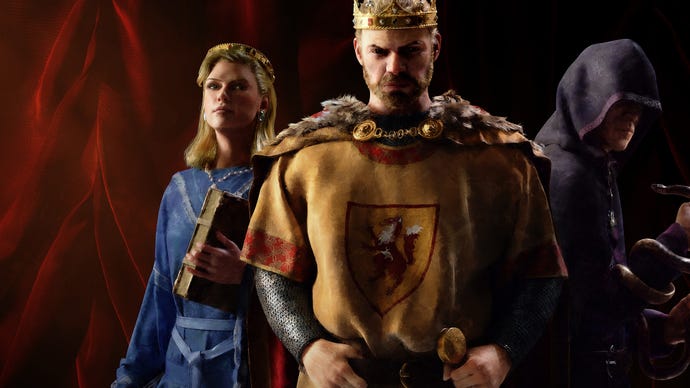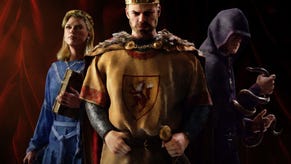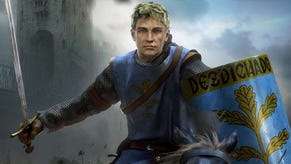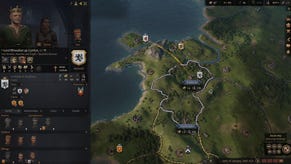How Crusader Kings 3 Plans to Attract Fans of RPGs, Sandbox Games, and The Sims
Paradox's grand strategy series wants to reach beyond its hardcore community.
This article first appeared on USgamer, a partner publication of VG247. Some content, such as this article, has been migrated to VG247 for posterity after USgamer's closure - but it has not been edited or further vetted by the VG247 team.
Losing my husband was only the beginning of losing my kingdom. I stepped into the role of High Chieftess Daurama of Kano in northwest Africa, a leader known for her excellent diplomatic efforts and sense of justice. After years of supporting my husband, the High Chieftain Bayajidda, in his weird artistic pursuits and delivering several children, I was shocked to hear some court intrigue about my man stepping out on me. I put my spymaster to work finding out the truth, only to learn that not only did he have a side piece—a lowborn lady named Barakissa—they had a child as well!
But I was a just ruler, so I put it aside for a moment. Surely, there were other things that were more important, like someone trying to assassinate me. Twice! I sent my spymaster out again, determined to find the traitor. I should've known who was behind the fiendish plot though: my rival, Bagwariya. So now I had an unfaithful husband and a murderous rival. Me, the honest and just High Chieftess!
Then the house of cards began to fall to pieces. Chieftain Isli of Takkeda decided to invade my peaceful lands. My proper spymaster, my half-sister Shawata, and I was forced to replace her with an idiot. I tried to have Bagwariya murdered by said idiot, but being pretty bad at intrigue meant my plot was discovered almost immediately. And my steward decided, in the middle of my crumbling rule, to profess his love for me. (Read the room!) My rule ended with an unfaithful husband, a captured sister, and a load of stress as I tried unsuccessfully to kill my rival. And this grand tale of an innocent leader assailed on all sides was just my first stab at Crusader Kings 3.
I've never played the previous Crusader Kings titles. I enjoy a good strategy game, but Paradox Interactive's grand strategy games—Crusader Kings, Europa Universalis, and Hearts of Iron—have always seemed too daunting. It's something the developers have realized as well, and it's one of the driving forces behind the development of Crusader Kings 3.
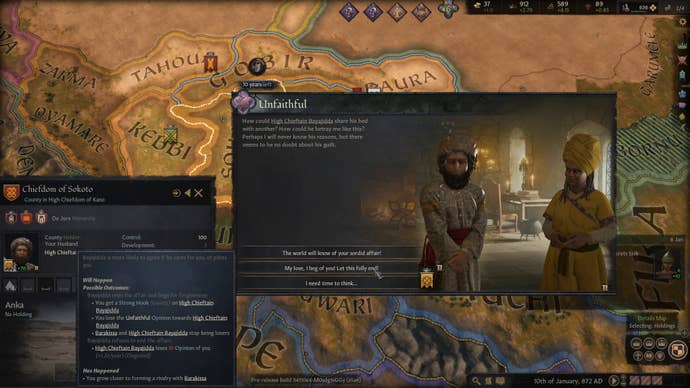
Approachability is King
At the top level, Paradox knows the sentiment around games like Crusader Kings. There's a depth you'll find that's far beyond most other strategy titles, but if you're willing to give them your attention, there's nothing else quite like them. That's how Paradox established its name in the first place.
"Crusader Kings is not an easy game to get into," lead designer Alexander Oltner agrees. "The information you need is usually hidden in an interface somewhere. It's always present somewhere, but you don't know where to look for it."
So with Crusader Kings 3, there are more systems to ease the player into the experience. There's a tutorial, but there are also other new additions like the Issues widget. This widget appears while you're playing CK3 and lets you know which current events need your attention, like a declaration of war, a vassal demanding your attention, or one of your territories rebelling against your rule. It also offers suggestions as to your next course of action. It's a way to focus the day-to-day management of the kingdom.
"There were a lot of design changes with approachability in mind," game director Henrik Fåhraeus says. "The Issues widget we feel was a natural step for us, for the grand strategy genre. There's so many things going on in the world. In [Crusader Kings 2], you had to click around and look, 'Where in the line of inheritance am I?' We thought, 'Why not collect all that useful information?' Approachability was one of our main goals with Crusader Kings 3."
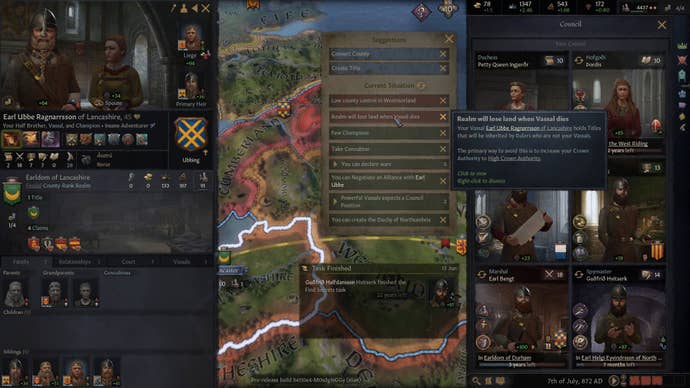
"It's a fantastic tool, even for long-time fans of the series," Oltner adds. He notes that he's played thousands of hours of Crusader Kings, and the Issues widget is there to give information he otherwise would've had to hunt for. It illuminates Crusader Kings 3's systems without dumbing them down.
Tooltips have also seen an overhaul, allowing you to hover over blue text to get even more information. "A problem that all our previous games faced is for us to properly explain how a mechanic works or what a certain number does for you, we had to put all of the information in the tooltip," Oltner says.
With the new system, initial tooltips are concise, offering only the information that is needed. The tooltips will nest themselves, and you can go as deep as your want. Paradox Interactive has also added a full Encyclopedia, not unlike the more mainstream Civilization series from Firaxis. The encyclopedia makes it possible to look up all the terms and features in a more robust fashion than the shorter tooltips.
While some of these features mirror other strategy titles, they're additions to the existing depth of Crusader Kings 3, as opposed to taking away from what long-time fans love about the series.
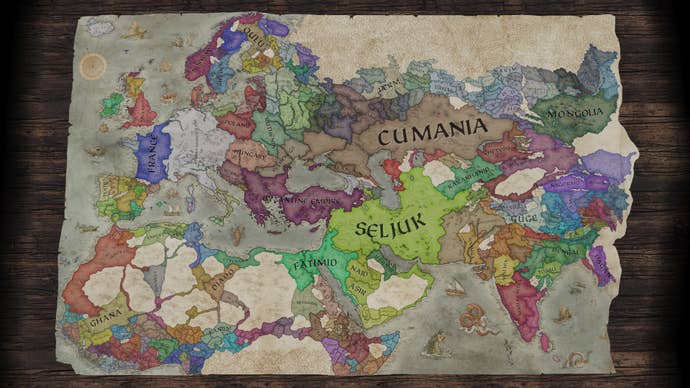
To Compose Our Character is Our Duty
Loading up the world map of Crusader Kings 3 presents an almost dizzying array of choices. It stretches from the frozen north down to central Africa, and from the British Isles all the way over to the empire of Mongolia. In terms of eras, the game starts in 867 and officially ends in 1453, though it's possible to toggle that ending off and let the medieval world last forever. Nevertheless, Crusader Kings isn't about land and empires.
"Crusader Kings 3 is really all about characters," says Fåhraeus. "With the third entry in the series, we really went as deep as we could into the character-based mechanics."
There are thousands of characters to pick from Crusader Kings 3's opening map. Your spouse, children, and vassals all have their own personalities and agendas, many of which will conflict with your own. In Crusader Kings 3, your job is to navigate the space between all these competing interests.
Every character in Crusader Kings 3 comes pre-made, with their own starting mix of stats, traits, and titles. The stats—Diplomacy, Martial, Stewardship, Intrigue, and Learning—determine how good your ruler will be at specific facets of their rule; don't worry, vassals will help you fill out the spaces where you're deficient. You can lean your character towards a specific stat by choosing a Lifestyle; these are full skill trees related to each stat that reward you with bonuses. That means in the long-term, a Diplomacy focused character will have many more ways to pacify their friends and foes with words, as opposed to another character living a Martial Lifestyle.

Traits highlight specific sides of every character: a vassal with the Arrogant trait will have a lesser opinion of their liege for example, because they obviously think they can do the job better. They also absolutely hate those with the Humble trait. A Brave character has improvements to their Martial skills, but also a much higher chance of dying in battle.
There's also a new mechanic called Stress, represented by a small meter to the left of your character portrait. Stress increases anytime your character goes against their nature. This addition is meant to address a problem in the previous Crusader Kings, where your character could act against their own nature. If you're a cynic who doesn't believe in religion, having to go on a religious pilgrimage will stress you out. When my first character, Daurama, decided to start investigating her husband, the shift in priorities added stress upon her shoulders. I was a fine, upstanding leader! Why should I be forced into skullduggery because my husband couldn't keep his dick to himself?
Gaining too much stress creates a mental break; you won't die, but you will operate at a lesser capacity. The only real game over in Crusader Kings 3 comes from dying without a proper heir. You are playing a character, but you're also a dynasty. When your starting character dies, you'll move to your primary heir, so part of playing is making sure to set your children up for success. Assuming your children are actually your intended heirs, of course. (You can be a celibate character, but sadly, there's no adoption in Crusader Kings 3, so you best get to having kids.)
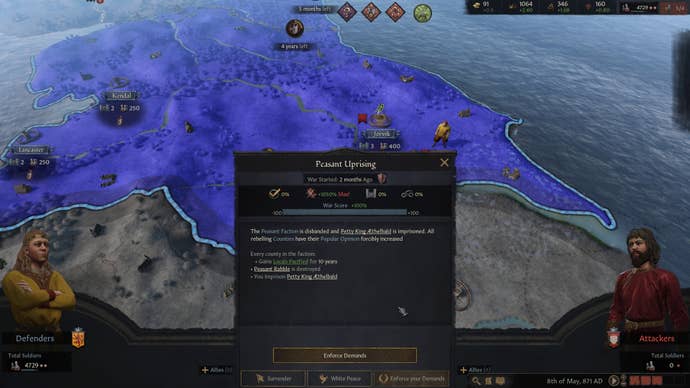
Confusion of Counsel
You can't manage your kingdom alone, though. Rights to territory are given by titles, and your character can only control so many counties, cities, and baronies without incur a step penalty to your ability to control them. On my second playthrough as Jarl Halfdan of Jorvik, I actually controlled too much territory, leading to very dissatisfied citizens. The peasants even rose up as a faction against me, forcing me to put them down with martial force. I had their leader, Petty King Æthelbald, executed for his crimes as a lesson to the rest.
To prevent having to kill your own people, you'll need to rely on your council. These are vassals who you assign to various positions that correspond to the stats. For example, the Marshal is related to the Martial stat, and helps you retain control of territory or fight your wars, while the Intrigue-focused Spymaster is all about schemes, blackmail, and even a little murder.
One of the biggest issues I had was managing all these folks vying for power. I took more land than I could hold, so I figured it wouldn't be a problem to give one of my Commanders, Bengt, a bit of land to watch over. Unfortunately, I didn't pay attention to the fact that Bengt was a greedy man—literally, it was one of his traits—so once he became an Earl, he wanted to be on my Council. Keeping Bengt happy while also keeping him off my Council was as huge problem for years… until he randomly died. (I didn't do it!)
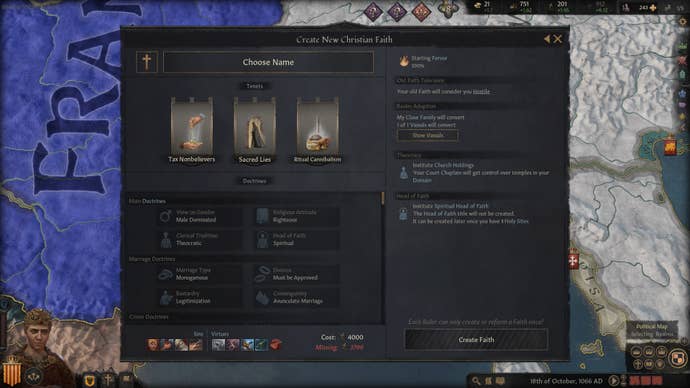
There's also your religious leader. The position doesn't go to a vassal, instead falling to an independent character who can support or denounce you. The religious leader brings in money in tithes and can convert faith in a territory, so you don't want them angry at you.
Crusader Kings 3's religious system has received a huge boost over the previous entry. Each Faith is like its own character, full of Tenets and Doctrines that help drive how your character, your vassals, and your religious leader will react to your actions. You can't take concubines outside of your spouse if you're a Catholic ruler for example, because marriage is monogamous.
Oltner says there are 99 faiths in Crusader Kings 3, spread across all the available characters and territories. That said, you can create your own faiths as well. (This is in fact, the only way to change a faith's tenets and doctrines.) The faith creation system costs Piety, a resource you gain by being a proper, upright person in your faith. The more changes you make to a faith, the more piety it costs. It's another outlet for character expression in Crusader Kings 3, another way to guide the forces of history to your own end.
There's a lot I still don't understand about Crusader Kings 3. But in my short playtime, I was able to glean why fans love the series dearly. Crusader Kings 3 is a machine for creating interesting stories, unique moments that you can share with friends and fellow players.
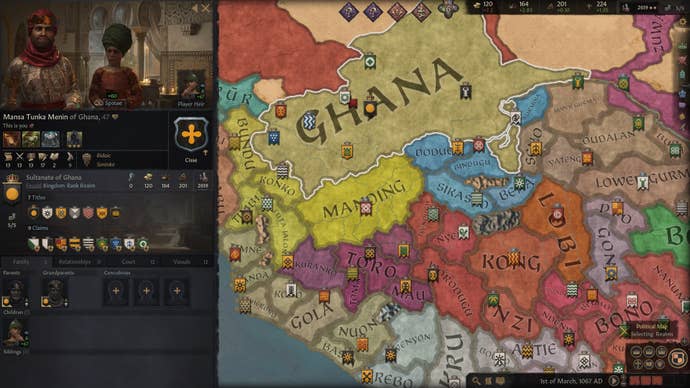
It's the idea of an RPG at its most dense and expansive. You control one character, one dynasty, but you're interacting with an entire world of detailed NPCs, half of whom want to love you, and the other half who want you dead. Every new game I started with a new character had a different outcome, and I know I only saw a small part of the epic journey that is Crusader Kings.
The development team at Paradox Interactive want Crusader Kings 3 to reach out to new players like myself. Perhaps with a bigger focus on characters, as well as new systems to ease players into the experience, Paradox can help CK3 reach that larger audience.
"I'm hoping that it will attract all strategy gamers to begin with, and also a fair share of people who enjoy role-playing and sandbox type games," Fåhraeus says. "I hope, of course, that a few more women will play [Crusader Kings 3], more than they ever did CK2. I've always wanted [The Sims] players to try CK. We'll see if we succeed better this time."
